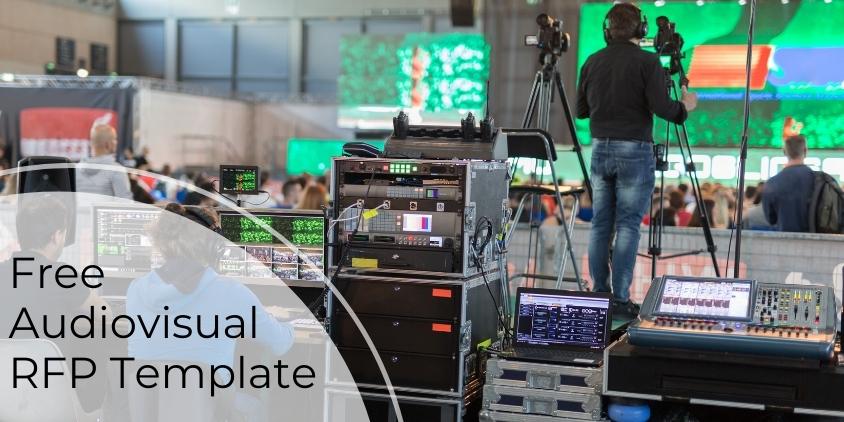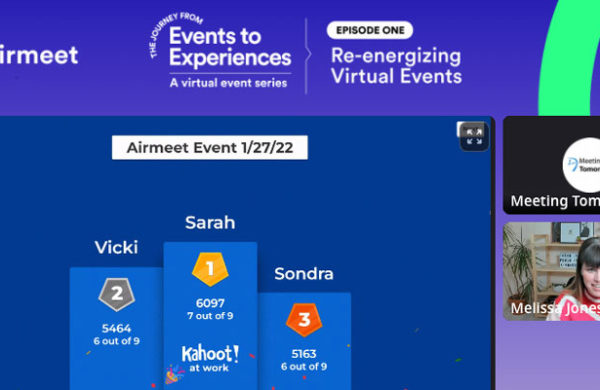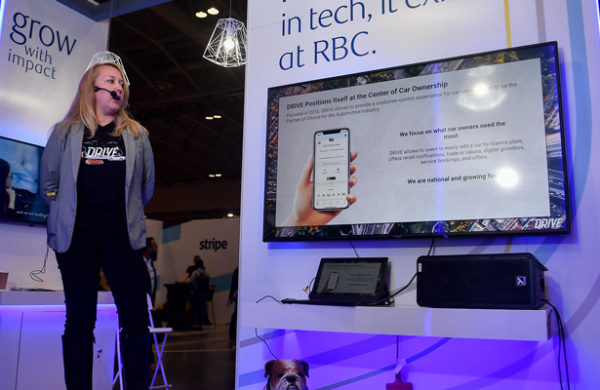
Planning an event and need to find an AV provider? You’ll need to let the world know what you’re looking for so potential partners can propose their solutions to you. We know that putting together a Request For Proposal (RFP) can be an overwhelming process for meeting planners.
Where do you start, how do you get it in the right hands, what do you actually need to ask for? It can be daunting and make you want to Run For Protection (RFP). Alas, no need to worry! Once you know how to start and what to keep in mind, it can be a Really Fun Process (RFP).
For Meeting Tomorrow, being on the receiving end of RFPs for years has given us perspective on what you should keep in mind when building out an RFP. We’ve figured out what kind of information you should share about your event so AV companies are equipped to provide the best solutions that fit your actual needs.
Additionally, we’ve learned what kind of questions will pull out useful information from potential vendors so you can make the right decision on who to work with. Our goal is to provide tools for you to create your next RFP and be Ready For Productiveness (RFP).
Here’s our free template for creating a powerful audiovisual RFP!
(Include) Think About The Past, Present, and Future
First things first – why is the event taking place? What are you trying to accomplish? What’s its purpose? There must be a reason why you’re holding the event versus sending out an informative email or link to a pre-recorded video. Who are the attendees? Is it an internal or external event? How do you want audience members to feel during and after the event? What do you want them to remember a week later? What would make the event a success? Is this the first time you’re holding the event, or the 14th time? What’s important to you event-wise, but also as a company? Long story short, provide context.
(Include) Equipment List…And Then Some
Details, details, details. They can be for the current event, but they can also be from prior events that are similar in size and scope. For example: equipment list, agenda, schedule-at-a-glance, venue/dates/times.
Any information you have is helpful! If you simply ask for a projector, screen, sound system, and lights, you’ll get a wide array of answers from different AV providers. That’s not helpful to you and you’ll waste time sorting through the RFP responses. There are a million and one ways to meet those needs so by providing robust detail, context, and budget restrictions, AV companies will provide realistic solutions that align with what you’re looking for.
Related, provide a basic idea of dates and times. Even if you don’t have it exactly nailed down, you’ll likely have a rough idea of how each day will look. Aside from when the general session and breakout sessions take place, folks tend to forget about rehearsals or evening events. Sharing those details ahead of time make a huge different and can save you from unexpected costs in the future.
Finally, provide some context on key event initiatives you’re trying to accomplish. If you use the same RFP template and event description every year, you’re going to get the same results. Maybe attendance was unusually low last year, or you need more sponsorship options. The following year’s RFP should mention you’re trying to up attendance, or you’re seeking ways to incorporate additional sponsorship! You aren’t going to get custom and creative responses that suit your needs if you don’t share specific context and details.
(Ask) The Basic Stuff
This is the typical information you’d normally think to ask for – company name, address, years of experience, contact information, etc. Cross your t’s and dot your i’s, then move onto the good stuff!
(Ask) Actual Experience
If you were conducting real-life interviews with applicants for an open Project Manager position, you’ll likely ask situational questions. You’d want to know how they’ve handled problems, managed a large project, or approached a difficult task. Just because a potential AV provider meets basic requirements (years of experience, nationwide presence), doesn’t mean they’ll handle events (or problems) in a manner that’s in line with what you’d do. Make sure you’re getting a full picture of how a vendor operates on their good and bad days.
Questions could include:
- Provide an example of how your company has responded to last-minute event changes (including budget cuts or logistical issues)
- Describe a challenging event your company has executed, including hurdles you had to overcome and how you added value to the event
- Explain how our company values will be intertwined with event execution
- Describe what you’d do if a key crew member or crucial piece of equipment suddenly became unavailable for the event.
Also, get a well-rounded idea of an AV company’s experience and creativity. Pictures or renderings of past events, references you can speak to, description of work and process on an event from start to finish, etc. Perhaps provide an imaginary discretionary budget – if you had an extra $10,000, how would you use those funds? This allows potential partners to flex their creativity muscles and you can see what kind of options open up if that money magically shows up on your doorstep.
(Include) What’s Next?
Provide a general timeline of the RFP process, otherwise vendors will constantly follow up with you. Aside from a due date, include when you plan to internally meet and discuss RFP responses, when in-person (or video) presentations can be scheduled, and when you’d ideally like to make a decision. Overall, the more detail and insight you provide into your decision making process, who you are as a company, and the purpose and key initiatives of your event, the higher caliber of responses you’ll get. Do some heavy lifting early on in the process and you’ll increase the likelihood of choosing an AV partner that’s the right fit for you.



